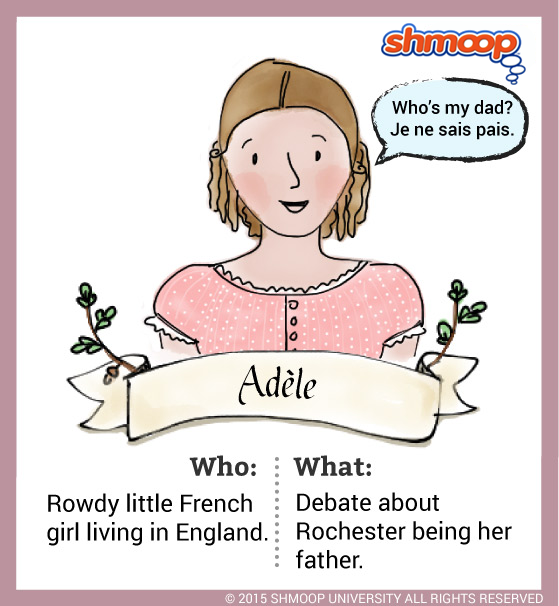Character Analysis

(Click the character infographic to download.)
Adèle is Jane’s pupil at Thornfield, a little French girl just under ten years old, the daughter of Céline Varens (an opera dancer who was Rochester’s mistress). She's creepily precocious.
Mostly, Adèle is an opportunity for Jane to show her teaching skills and her compassion. When Jane first meets her, Adèle’s only been in England for a few months, and she’s never really been asked to study or apply herself; all she really cares about are clothes and getting attention by showing off her singing and dancing skills (all learned from her mom, so mostly inappropriately mature for a little girl). This gives her a little bit of a creepy Lolita feel, but it never fully manifests.
Adèle Rochester?
It’s not clear whether Adèle is actually Rochester’s daughter. Things that suggest she is: her mom said she was, Rochester was sleeping with Céline at the time Adèle was conceived, and he felt ethically obligated to take care of Adèle when her mom abandoned her. Things that suggest she isn’t: both Rochester and Jane think that Adèle doesn’t look or act like him at all, and Céline was cheating on Rochester at the time Adèle was conceived.
Too bad there wasn’t any DNA testing available in the nineteenth century; we need Maury Povitch to sort this one out.
Adèle does grow and develop as a character; at the very end of the novel, Jane tells us about the various stages of Adèle’s education, which start to resemble Jane’s education quite a bit:
You have not quite forgotten little Adèle, have you, reader? I had not; I soon asked and obtained leave of Mr. Rochester, to go and see her at the school where he had placed her. Her frantic joy at beholding me again moved me much. She looked pale and thin: she said she was not happy. I found the rules of the establishment were too strict, its course of study too severe for a child of her age: I took her home with me. I meant to become her governess once more, but I soon found this impracticable; my time and cares were now required by another—my husband needed them all. So I sought out a school conducted on a more indulgent system, and near enough to permit of my visiting her often, and bringing her home sometimes. I took care she should never want for anything that could contribute to her comfort: she soon settled in her new abode, became very happy there, and made fair progress in her studies. As she grew up, a sound English education corrected in a great measure her French defects; and when she left school, I found in her a pleasing and obliging companion: docile, good-tempered, and well-principled. (3.12.11)
Maybe the cycle is starting all over again: just as Jane suffered under the strict discipline and neglect at Lowood, Adèle has a similar unpleasant boarding school experience that seems to turn her into a useful, principled English girl.